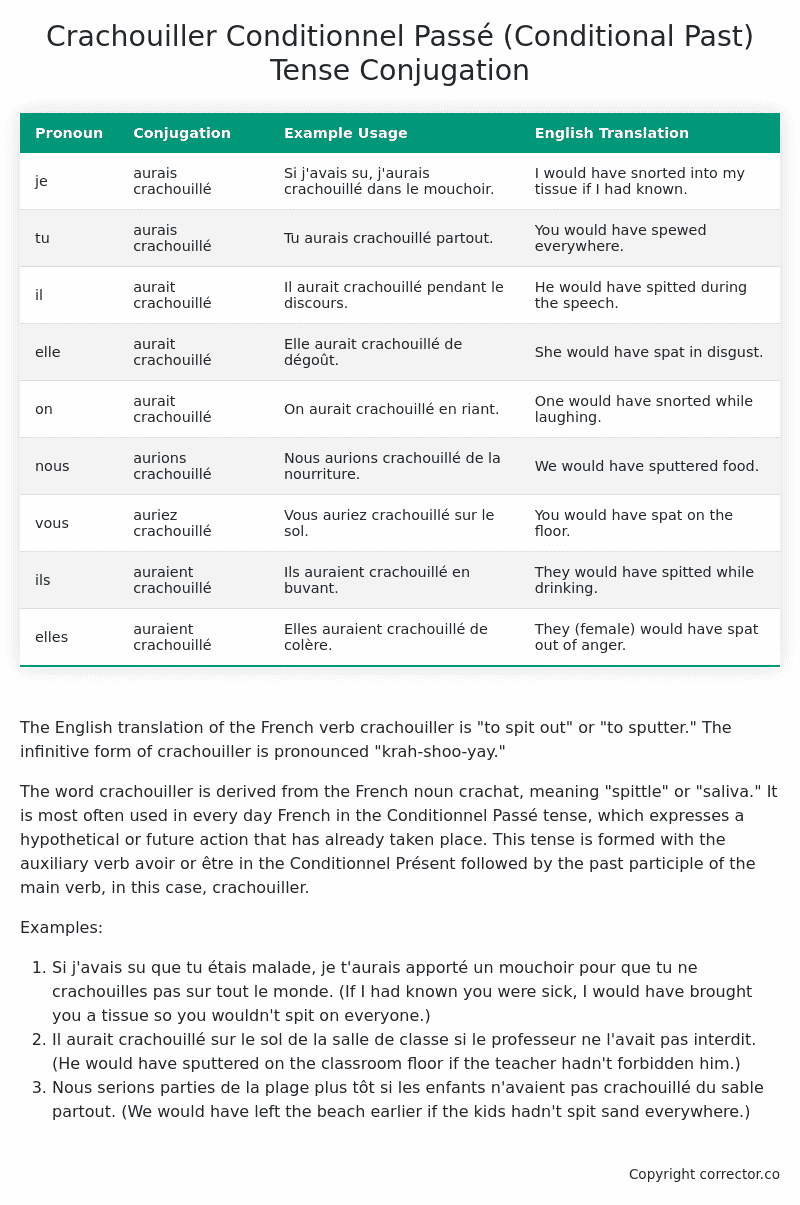Conditionnel Passé (Conditional Past) Tense Conjugation of the French Verb crachouiller
Introduction to the verb crachouiller
The English translation of the French verb crachouiller is “to spit out” or “to sputter.” The infinitive form of crachouiller is pronounced “krah-shoo-yay.”
The word crachouiller is derived from the French noun crachat, meaning “spittle” or “saliva.” It is most often used in every day French in the Conditionnel Passé tense, which expresses a hypothetical or future action that has already taken place. This tense is formed with the auxiliary verb avoir or être in the Conditionnel Présent followed by the past participle of the main verb, in this case, crachouiller.
Examples:
- Si j’avais su que tu étais malade, je t’aurais apporté un mouchoir pour que tu ne crachouilles pas sur tout le monde. (If I had known you were sick, I would have brought you a tissue so you wouldn’t spit on everyone.)
- Il aurait crachouillé sur le sol de la salle de classe si le professeur ne l’avait pas interdit. (He would have sputtered on the classroom floor if the teacher hadn’t forbidden him.)
- Nous serions parties de la plage plus tôt si les enfants n’avaient pas crachouillé du sable partout. (We would have left the beach earlier if the kids hadn’t spit sand everywhere.)
Table of the Conditionnel Passé (Conditional Past) Tense Conjugation of crachouiller
| Pronoun | Conjugation | Example Usage | English Translation |
|---|---|---|---|
| je | aurais crachouillé | Si j’avais su, j’aurais crachouillé dans le mouchoir. | I would have snorted into my tissue if I had known. |
| tu | aurais crachouillé | Tu aurais crachouillé partout. | You would have spewed everywhere. |
| il | aurait crachouillé | Il aurait crachouillé pendant le discours. | He would have spitted during the speech. |
| elle | aurait crachouillé | Elle aurait crachouillé de dégoût. | She would have spat in disgust. |
| on | aurait crachouillé | On aurait crachouillé en riant. | One would have snorted while laughing. |
| nous | aurions crachouillé | Nous aurions crachouillé de la nourriture. | We would have sputtered food. |
| vous | auriez crachouillé | Vous auriez crachouillé sur le sol. | You would have spat on the floor. |
| ils | auraient crachouillé | Ils auraient crachouillé en buvant. | They would have spitted while drinking. |
| elles | auraient crachouillé | Elles auraient crachouillé de colère. | They (female) would have spat out of anger. |
Other Conjugations for Crachouiller.
Le Present (Present Tense) Conjugation of the French Verb crachouiller
Imparfait (Imperfect) Tense Conjugation of the French Verb crachouiller
Passé Simple (Simple Past) Tense Conjugation of the French Verb crachouiller
Passé Composé (Present Perfect) Tense Conjugation of the French Verb crachouiller
Futur Simple (Simple Future) Tense Conjugation of the French Verb crachouiller
Futur Proche (Near Future) Tense Conjugation of the French Verb crachouiller
Plus-que-parfait (Pluperfect) Tense Conjugation of the French Verb crachouiller
Passé Antérieur (Past Anterior) Tense Conjugation of the French Verb crachouiller
Futur Antérieur (Future Anterior) Tense Conjugation of the French Verb crachouiller
Subjonctif Présent (Subjunctive Present) Tense Conjugation of the French Verb crachouiller
Subjonctif Passé (Subjunctive Past) Tense Conjugation of the French Verb crachouiller
Subjonctif Imparfait (Subjunctive Imperfect) Tense Conjugation of the French Verb crachouiller
Conditionnel Présent (Conditional Present) Tense Conjugation of the French Verb crachouiller
Conditionnel Passé (Conditional Past) Tense Conjugation of the French Verb crachouiller (this article)
L’impératif Présent (Imperative Present) Tense Conjugation of the French Verb crachouiller
L’infinitif Présent (Infinitive Present) Tense Conjugation of the French Verb crachouiller
Struggling with French verbs or the language in general? Why not use our free French Grammar Checker – no registration required!
Get a FREE Download Study Sheet of this Conjugation 🔥
Simply right click the image below, click “save image” and get your free reference for the crachouiller Conditionnel Passé tense conjugation!

Crachouiller – About the French Conditionnel Passé (Conditional Past) Tense
Formation
Common Everyday Usage Patterns
Expressing Unreal Past Scenarios
Polite Requests or Suggestions
Expressing Doubt or Uncertainty
Interactions with Other Tenses
Conditional Present
Indicative Past Tenses
Conditional Future
Summary
Want More?
I hope you enjoyed this article on the verb crachouiller. Still in a learning mood? Check out another TOTALLY random French verb conjugation!


